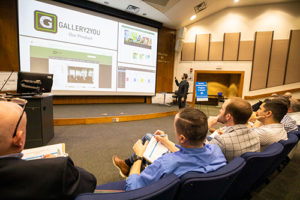GIVEN THE RUSH TOWARD TECHNICAL AND DATA-DRIVEN SKILLS, WHAT’S TO BECOME OF CHAUCER?
“Many people make the mistake of thinking that a liberal arts degree will not help them in the business world,” writes Brian Sullivan, who received his bachelor’s degree in political science at the University of Texas at Arlington (UTA) and his master’s degree in English literature at the University of North Texas (UNT).
Sullivan — director of design strategy at Southlake-based Sabre, a developer of technology for travel companies across the globe — could be considered a poster boy for the power of a liberal arts education in the tech economy.

“At the time (in the mid-1990s), I was studying at UNT,” he writes. “We did not have the explosion of smartphones, streaming services, same-day delivery services, app stores, and so on. We live in an attention economy, with so much data generated and sent out every minute of the day. It can be hard to organize, analyze, and distill what is important. How do you ignore the noise? How do you determine what’s important? Can you communicate this information quickly and efficiently?”
Sullivan gained those tools — analyzing, condensing and prioritizing reams of information into what’s important — over countless hours of reading, researching and, yes, thinking. Both at UNT and at UTA, where he studied political science.
“Corporate America is a real-time, everyday case study in political science,” he writes. “People have hidden agendas. They form tribes and alliances. You have to navigate
difficult conversations.”
It seems UNT boasts a plethora of liberal arts graduates, aside from Sullivan, who have gone on to make a global impact:

-
-
- Journalism grad Wende Zomnir launched a worldwide initiative for equal pay, education and fair treatment for women, funding seven nonprofits across the world in the process.
- Marketing grad Kathleen Wayton harnessed the problem-solving skills she honed at UNT to become the chief information officer at Southwest Airlines.
- Toni Reid — who is in charge of Amazon’s Alexa voice-driven app and its Echo devices — guided Alexa’s development, even including a “smart, humble, helpful, sometimes funny” personality, she told Variety in an interview that was published in June 2019.
-
“Toni Reid’s degree is in anthropology,” writes UNT Provost and Vice President for Academic Affairs Jennifer Evans-Cowley. “It was her ability to imagine how people could interact with technology that has allowed her to lead Amazon’s Alexa. Liberal arts majors are able to understand people and society in a way that can enable technological innovation to positively impact society.”
Realizing the humanities/tech connection, UNT and other universities are beginning to launch initiatives that combine liberal arts degrees with technical degrees to combine the best attributes of STEM and liberal arts educations, according to Evans-Cowley.
An analysis by Forbes cites the crucial role that liberal arts thinkers play in connecting products and services with consumers. Industry observers are increasingly pointing out the value of empathy, understanding of humanity, and perspectives that liberal arts graduates bring to tech.
“Chaucer is still relevant,” Evans-Cowley writes. “Our world is propelled by good storytellers.”
This article is part of the 2020 Higher Education Review Magazine.